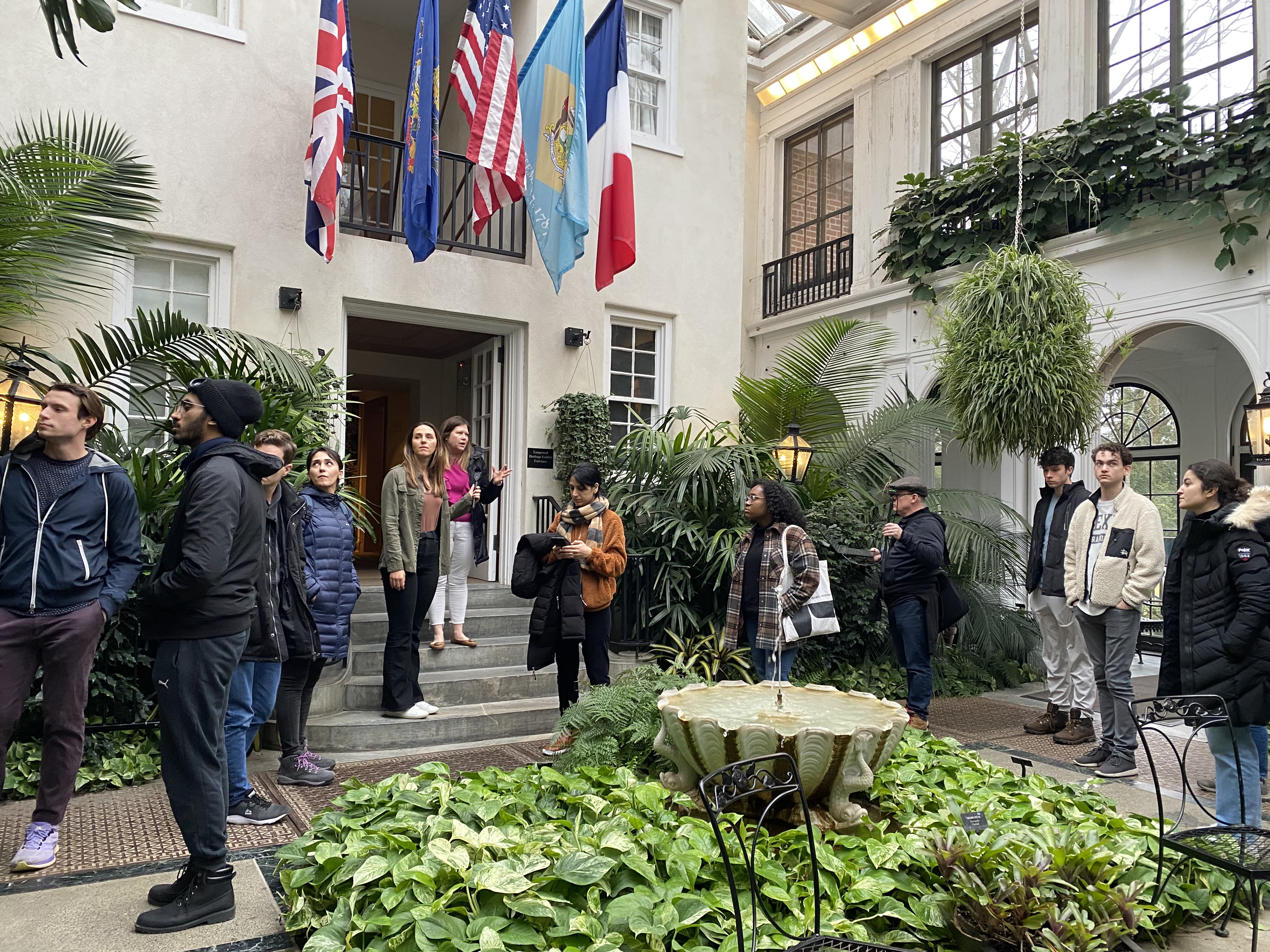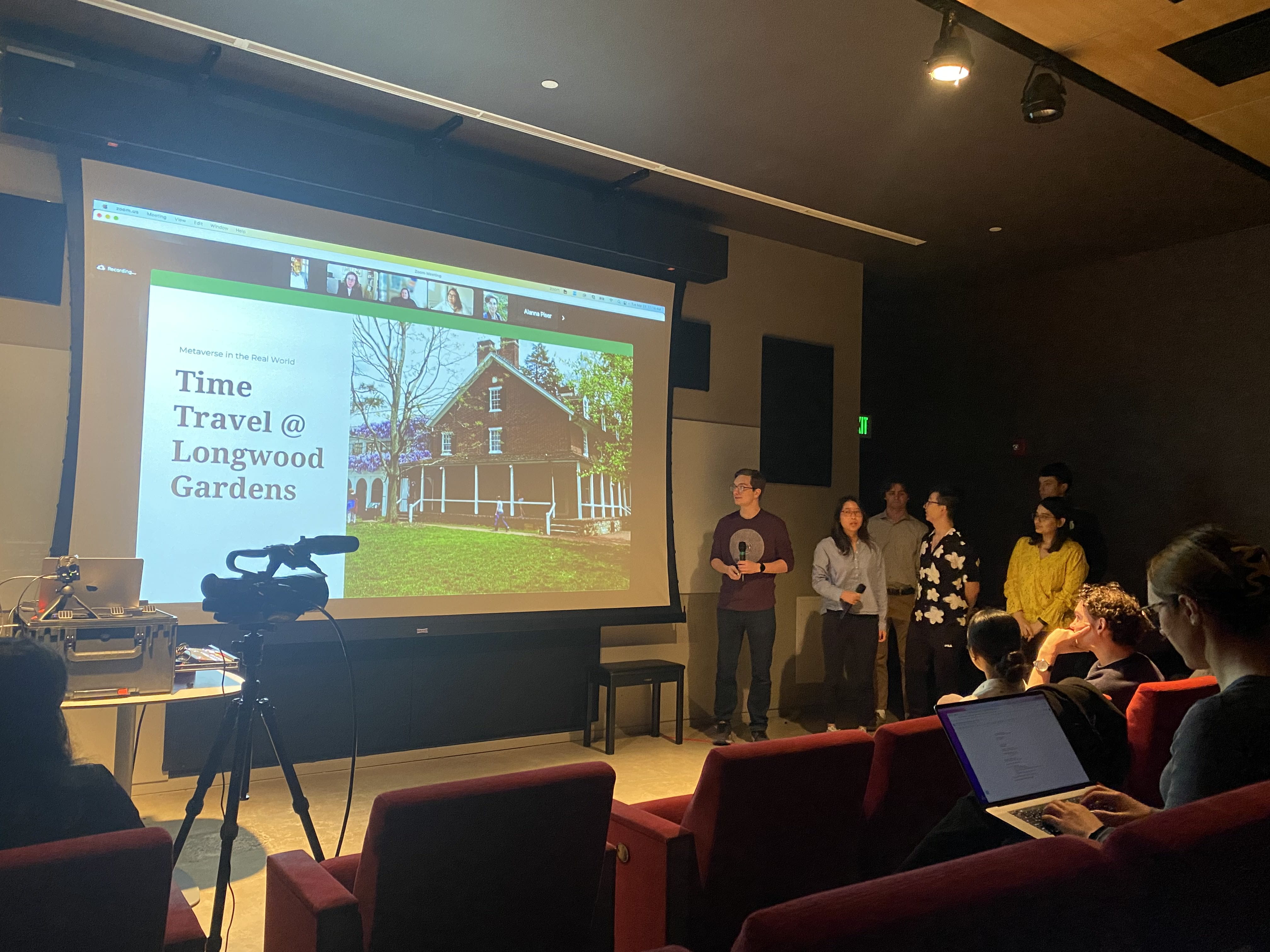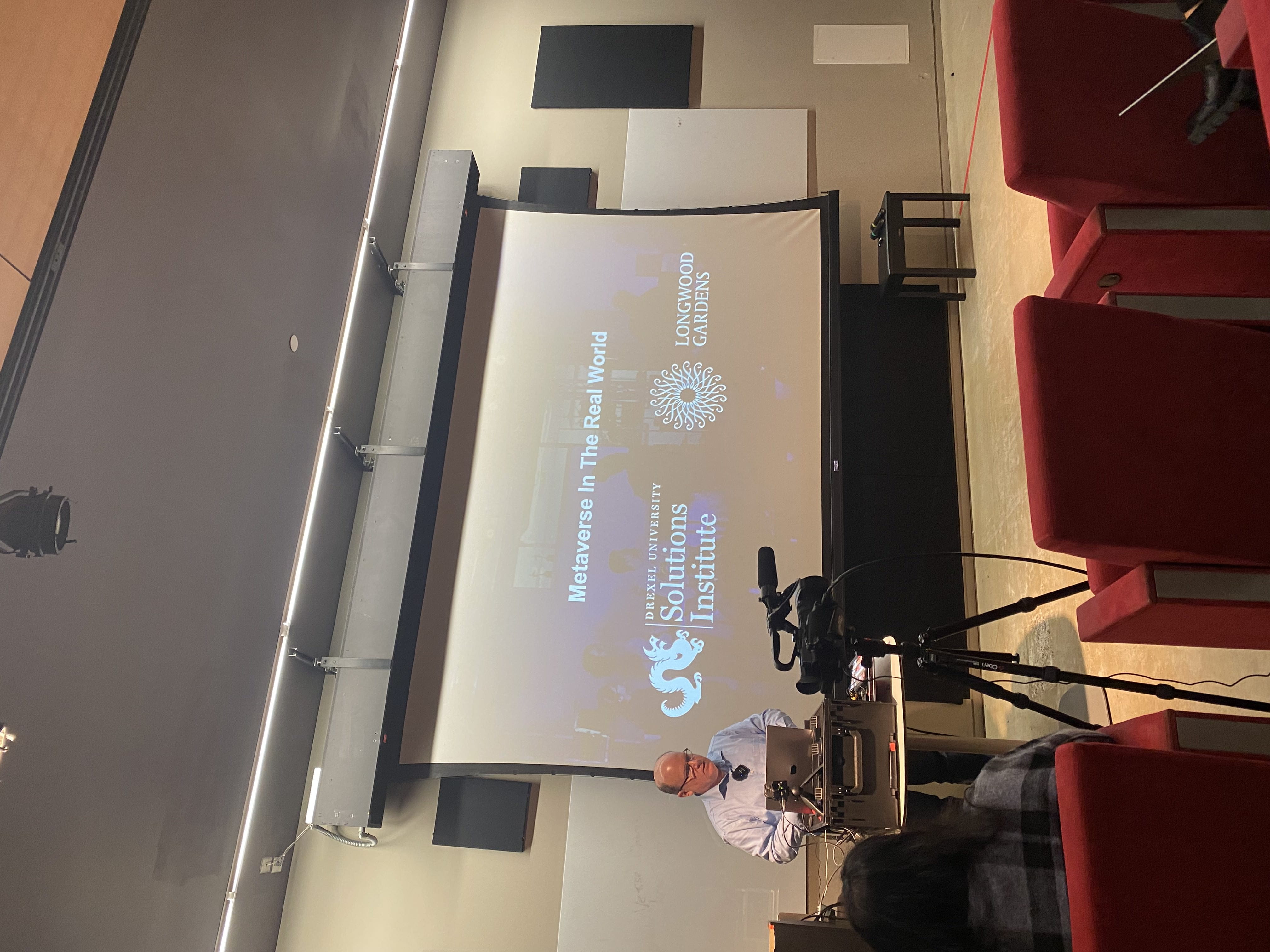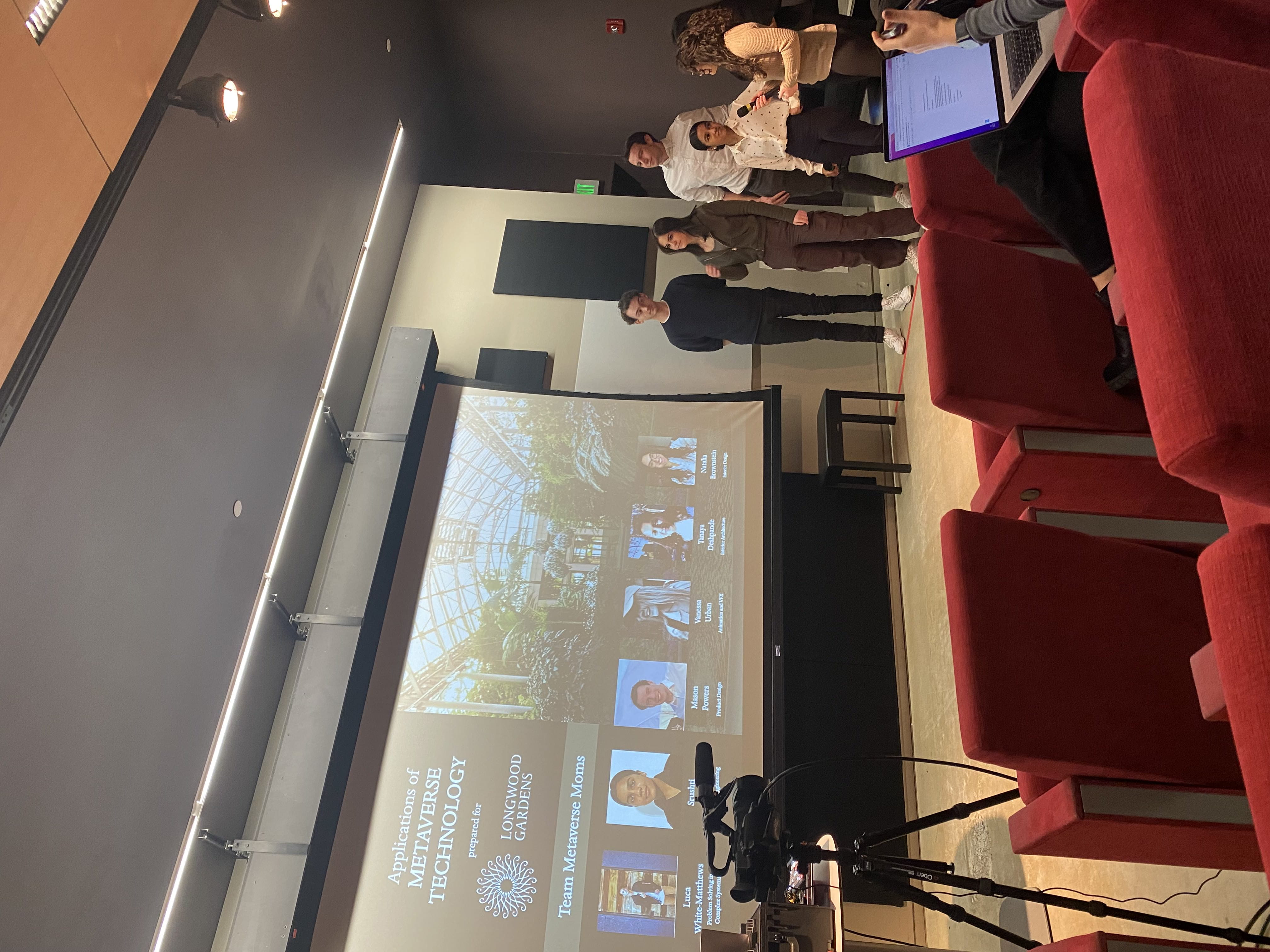Virtual Field Trips and Metahumans Take Stage in New Course with Longwood Gardens
By: Natalie Kostelni

When it came to leveraging the metaverse to build engagement and provide new experiences for visitors of Longwoods Gardens’ historical Peirce-du Pont House, student teams in the course Metaverse in the Real World (WEST T380-001H and DIGM T5800) had no shortage of ideas.
One team, the Metaverse Moms, proposed bringing Pierre S. du Pont and his wife, Alice Belin, back to life as holograms to host visitors and provide them with a tour and history of the gardens and house, which dates back to 1730. Plans included an app to bring this augmented reality experience to life, making it accessible to anyone with a mobile phone.

Longwood Dragons suggested a touchscreen kiosk to create an interactive, digital fountain experience highlighting its history, inner workings and engineering, and provided visitors the ability to design their own fountain show. Team Choose Wisely proposed an augmented reality version of du Pont that would tell stories about the house and rooms. The virtual du Pont would play out scenarios he would have once participated in such as hosting guests for a dinner, providing viewers a glimpse into the past.
And, lastly, Dragon Tails suggested an immersive digital art room that would be interactive and appeal to all ages. With a traveling dome, the exhibit could be taken on the road to schools and other venues to provide a virtual fieldtrip to Longwood Gardens, making it accessible to those who might otherwise be unable to visit.
“I took this class to get out of my comfort zone and it was one of the best classes I have taken. It’s definitely in the top 10,” said Meelan Dullabh, a senior majoring in International Business, Business Analytics, and Marketing who was part of Dragon Tails. “I will definitely remember this class.”
The variety of assignments, teachers and speakers, along with working with a “real client” made the course compelling for Dullabh.
“It was great,” he said. “Everything you learn in life serves as a building block, and I think this will somehow be incorporated in my job in the future.”
Metaverse in the Real World is an example of courses facilitated by the Innovation Engine, an initiative in the Provost’s Office focused on convening colleges and external partners around interdisciplinary, experiential learning opportunities that address real world challenges.
“The Innovation Engine fosters academic innovation and hands-on learning that forges connections among Drexel students, faculty and external partners through academic courses and research projects,” said Paul E. Jensen PhD, Executive Vice President and Nina Henderson Provost. “The Engine serves as a sandbox for the University to develop cutting-edge curricula, provide immersive learning and enhance the student experience. At its core, it embodies what Drexel is seeking to achieve with its Strategic Plan.”
The course invited undergraduate and graduate students and PhD candidates from a range of disciplines to bridge the divide between theory and practice as they worked with Longwood Gardens to explore new ideas using the latest technology. Students from a dozen disparate majors took the class. Product design, interior design, interior architecture, psychology, digital media, management and information systems, finance and real estate management were among the areas of study represented.

Instructors for the course included: Nick Jushchyshyn, associate professor and program director of the Digital Media & Virtual Production program and the Animation, Capture & Effects Lab at Westphal College of Media Arts & Design; Raj Suri, senior vice provost for academic-industry partnerships; and Neville Vakharia, associate dean for research and planning, and associate professor of arts administration & museum leadership.
The class introduced students to principles, theories, technologies, and techniques that form the metaverse. Students were assigned to apply that knowledge to Longwood’s desire to find new, innovative ways to showcase the du Pont House and engage visitors, serving its mission to educate, inspire and promote du Pont’s legacy.
“This thing people are calling the metaverse isn’t going to do us any good if we can’t apply it to the real world,” Jushchyshyn said. “I viewed partnering with Longwood as the ultimate test of these concepts. If the metaverse can be real, then it should be able to work at a place based on nature, and especially a place like Longwood, that is so engaged with the public and so incredibly special.”
The course provided an opportunity for Jushchyshyn, who has been working with metaverse media technologies for decades, to test approaches that would teach students with no prior background or experience with meta-technologies and task them with collaborating on a project.
“This is as close to a real-world test in an academic setting we could get,” he said. “They learned about these technologies and techniques, and then presented concept pitches based on what they learned about the value of these tools to an outside partner, in this case Longwood Gardens. I think it was a tremendous success.”
Luca White-Matthews, a senior graduating this year with a custom designed major focused on problem solving and complex systems from the Pennoni Honors College, said he was drawn to the course because it focused on the real world and undertaking a “consulting-style project” using a new technology. He was a member of the Metaverse Moms.

“The class was really, really cool, super educational and a really good example of what is uniquely valuable about Drexel,” he said. “What you do is engage in the real world and do it in a way that is multidisciplinary. With this class, you learned about the tools and concepts and explored them and then treated the class like a lab and the project like an experiment. That is the unique value of Drexel. It was a great way to end my college career.”
Students presented before a panel from Longwood Gardens, who peppered them with questions and compliments. Morgan Cichewicz, senior graphic designer at Longwood, participated on the panel and provided a unique perspective as a 2012 graduate from Drexel.
“It was very cool to see Longwood Gardens as a real-world case-study for students to explore and experiment with new technologies,” she said. “Legacy and innovation are strong ties between Drexel and Longwood, and Professor Nick Jushchyshyn was able to inspire students to see and explore those connections.”
Chichewicz was impressed with how students brought history to life through metahumans, incorporated interactive experiences that customized a visitor experience, paid attention to accessibility and integrated art, history and technology.
“It was great to see such a multidisciplinary range of students from undergrad, graduate and doctorate levels come together to explore the idea of technology in a garden space,” she said.
Course Highlights
Partner: Longwood Gardens
Innovation: Using metaverse technology to create visitor engagement and new visitor experience
Experiential Learning: Working with and visiting Longwood Gardens on the challenge of using new technology to create a new visitor experience Interdisciplinary: Taught by professors from Westphal and LeBow. Students comprised undergraduate, master’s and PhD candidates from a range of majors and disciplines
Drexel Area of Excellence: Computing, AI and Cyber Security Frontiers; Human-Centered Design; Entertainment and Culture
The course is part of a broader, ongoing relationship between Drexel and Longwood Gardens that includes several research projects, courses and other work facilitated by the Drexel Solutions Institute.